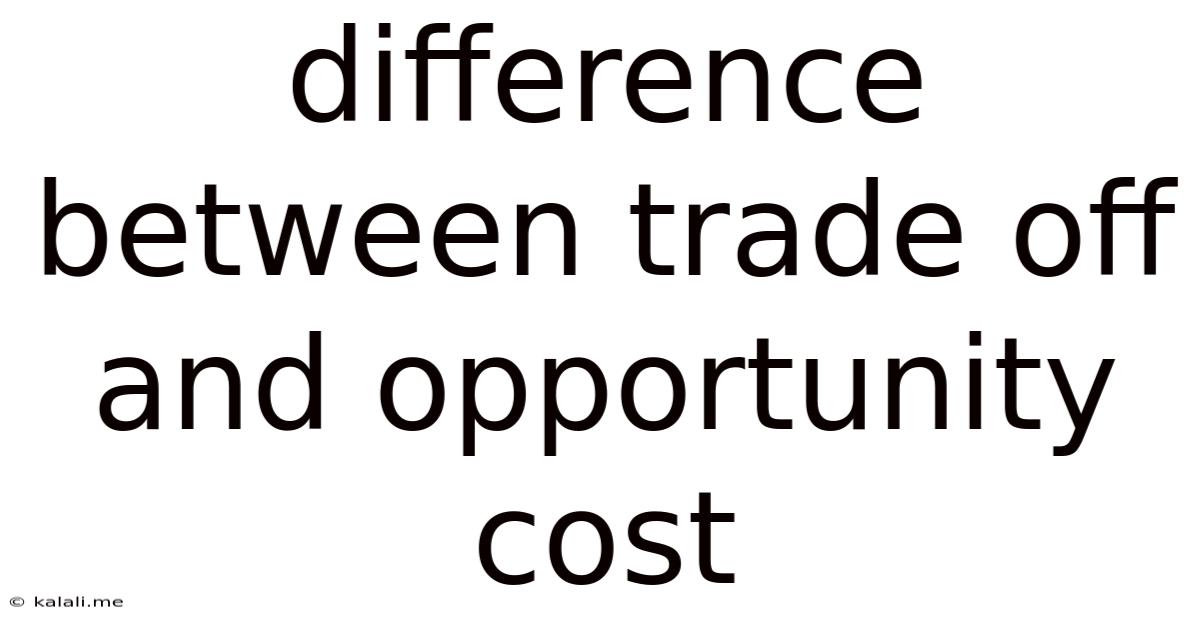Difference Between Trade Off And Opportunity Cost
Kalali
Jun 11, 2025 · 3 min read

Table of Contents
Trade-Off vs. Opportunity Cost: Understanding the Key Differences
Understanding the concepts of trade-offs and opportunity costs is crucial for making sound economic decisions, whether in personal finance, business strategy, or public policy. While often used interchangeably, these terms represent distinct but related ideas. This article will clarify the difference between trade-offs and opportunity costs, illustrating each with real-world examples.
Meta Description: Learn the key differences between trade-offs and opportunity costs. This article provides clear explanations and real-world examples to help you understand these essential economic concepts.
What is a Trade-Off?
A trade-off is a situational decision that involves choosing one option over another. It implies a conscious choice between two or more desirable alternatives, where selecting one necessitates forgoing the others. The essence of a trade-off lies in the acknowledgment of multiple attractive choices and the acceptance of giving up some benefits to gain others. It's about balancing competing priorities and making the best choice given the available options.
Examples of Trade-offs:
- Choosing between a new car and a vacation: You might decide to buy a new car, foregoing a luxurious vacation this year to achieve the long-term benefits of reliable transportation.
- A company deciding between investing in research and development or marketing: Increased R&D might lead to innovative products in the future, but investing in marketing could yield quicker sales and profits.
- Government spending on healthcare versus education: Allocating more resources to healthcare might improve public health outcomes, but could mean less funding for education initiatives.
Trade-offs are often presented in a binary fashion (option A or option B), but can include more options. The key is that a decision is made, and something is given up in the process.
What is Opportunity Cost?
Opportunity cost is the value of the next best alternative forgone when making a decision. It represents the potential benefit an individual, investor, or business misses out on when choosing one alternative over another. It's not simply about what is given up; it's about the value of what is given up – the potential benefit that could have been realized. Understanding opportunity cost helps individuals and businesses make more informed and efficient choices.
Examples of Opportunity Costs:
- Investing in stocks versus saving in a savings account: If you choose to invest in stocks, the opportunity cost is the potential interest you could have earned by keeping your money in a savings account.
- Attending college versus working full-time: The opportunity cost of attending college is the potential salary you could have earned if you had chosen to work instead.
- Using company resources for a new project versus working on existing projects: The opportunity cost of diverting resources is the potential profits or progress that could have been made on already underway projects.
Key Differences Summarized:
| Feature | Trade-Off | Opportunity Cost |
|---|---|---|
| Definition | Choosing one option over another. | The value of the next best alternative forgone. |
| Focus | The act of choosing | The value of the forgone alternative |
| Measurement | Qualitative – often difficult to quantify. | Can be monetary or non-monetary |
| Scope | Broader, encompassing multiple options. | Focused on the single best alternative forgone. |
The Relationship Between Trade-offs and Opportunity Costs:
While distinct, trade-offs and opportunity costs are inherently linked. Every trade-off involves an opportunity cost. When you make a trade-off, the opportunity cost is the value of the best alternative you didn't choose. Understanding the opportunity cost helps you make more informed trade-offs by allowing you to assess the potential benefits of alternative options.
In conclusion, while both terms relate to decision-making and resource allocation, understanding the nuances between trade-offs and opportunity costs is crucial for effective decision-making. Recognizing the value of what you’re giving up can lead to better choices in all aspects of life.
Latest Posts
Latest Posts
-
How Many Milliliters In A Half Gallon
Jul 02, 2025
-
How Much Can I Sell Bro For
Jul 02, 2025
-
How Many Bottles Is 64 Oz Of Water
Jul 02, 2025
-
How Many Ounces In Pound Of Meat
Jul 02, 2025
-
What Is The Diameter Of A Quarter
Jul 02, 2025
Related Post
Thank you for visiting our website which covers about Difference Between Trade Off And Opportunity Cost . We hope the information provided has been useful to you. Feel free to contact us if you have any questions or need further assistance. See you next time and don't miss to bookmark.